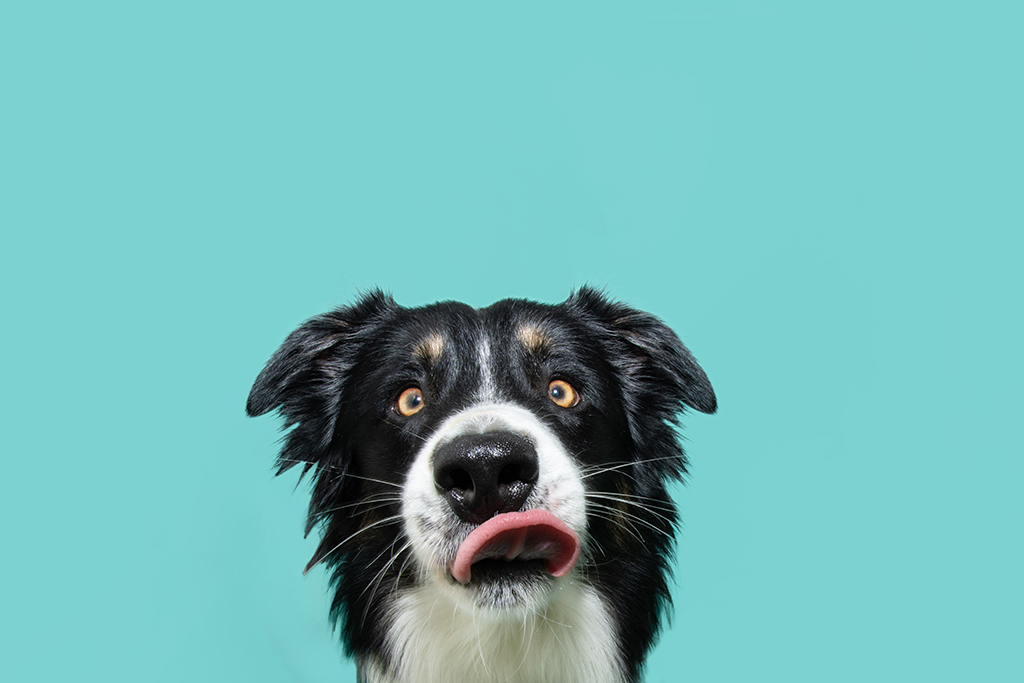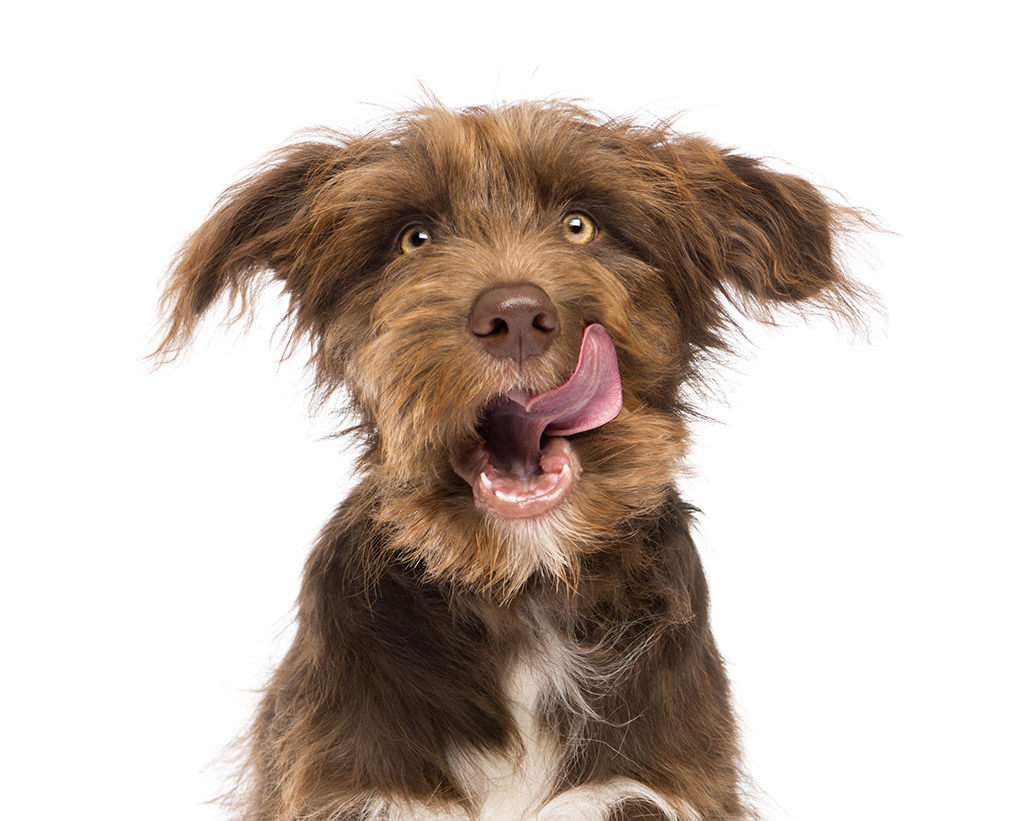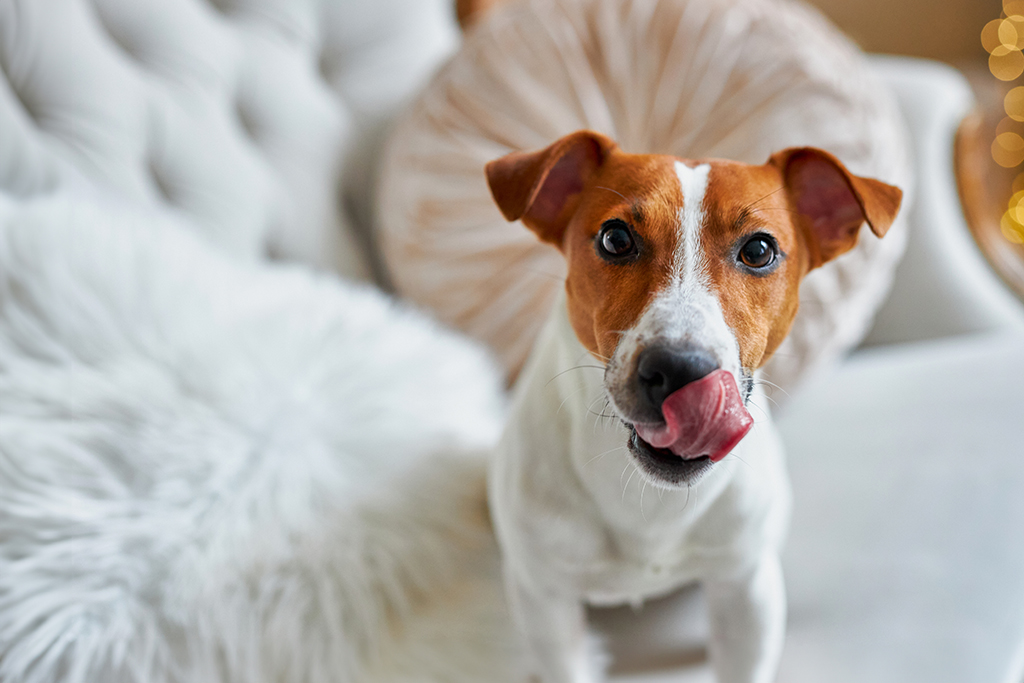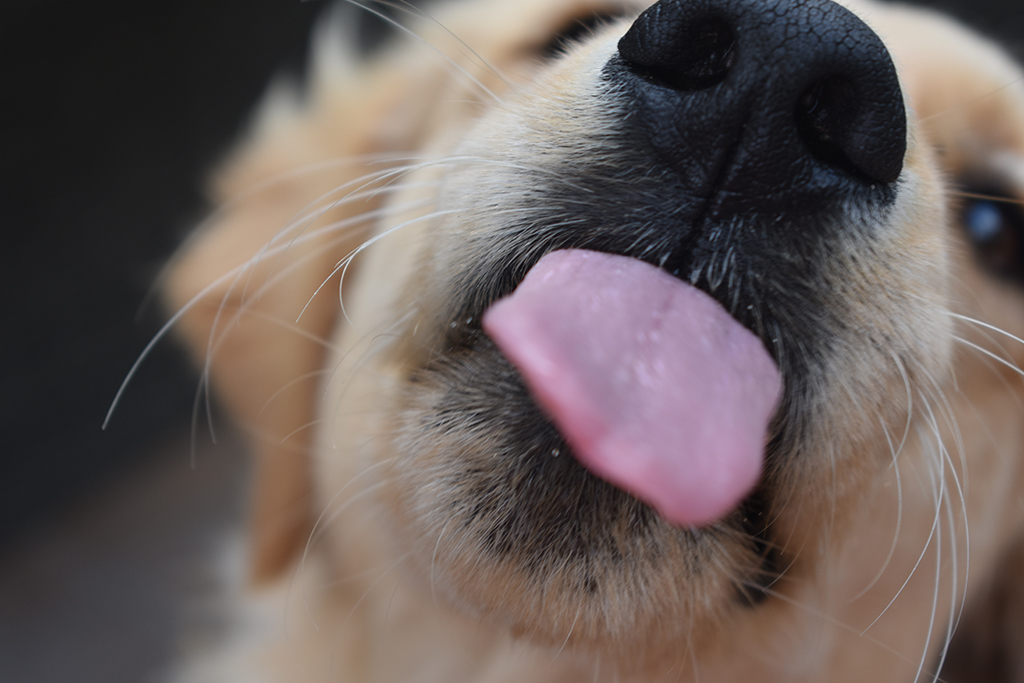
As any dog owner knows, we love our dogs, they’re part of the family. We give them special names and sing to them, we let them take up most of the bed and buy them their favourite treats; we plan our social lives around them and secretly judge people on whether or not they love our dogs too. And they love us back, right? They show it in lots of ways, including licking, which is surely the canine equivalent of a kiss, albeit a kiss with slightly dodgy doggy breath.
But what if we told you that dogs lick us for all kinds of reasons, and not all of them to do with how much they love us? What if we told you that what we see as them kissing us for being such brilliant owners, is actually them trying to get us to throw up our lunch so they can eat it?
Don’t panic, they do still think you’re their best humans, but it turns out there’s more to their licking than we originally thought. Let’s take a look!

WHY DO DOGS LICK?
Licking is a natural behaviour for dogs, and they lick people for a variety of reasons:
- Instinct – female dogs lick their puppies to clean them, it also stimulates their blood flow and encourages them to go to the toilet. Some puppies also lick their mother’s mouth, this is a way of greeting her, but also a way to encouraging her to go and get them some food; the mother will eat, then regurgitate it for the puppy to eat, (we did warn you…). Puppies soon learn that licking is a way of communicating with their caregiver – which is why you don’t often see adult dogs licking another dog’s face. To a dog, their human is their caregiver, and they can trigger a puppy-like response.
- Affection – this is the part we all want to hear – they’re doing it because they love us! Licking is an important part of the bonding process for dogs, they learned it from being puppies and their mothers licked them as part of grooming. It gives them comfort by releasing endorphins and dopamine, so in the same way that we get comfort from stroking our dogs, they get comfort from licking us, and are letting us know that they want to interact. It’s worth noting that that some dogs lick more than others, so if your dog isn’t much of a ‘licker’, it doesn’t mean they don’t like you, or are less affectionate, they’ve just learned things differently and prefer to show affection in different ways, such as hiding your slippers, or chewing the TV remote…

- Attention – we all know how needy our dogs are, particularly if they’re a bit bored, so any reaction they get will feel like a reward to them, even if it’s negative. If your dog licks you then you’ll respond by either talking to them, stroking them or just generally making a fuss of them and they’re more likely to repeat the behaviour; basically, you fell right into their trap!
- We taste good – Does your dog lick you after you’ve done some exercise? Our sweat holds salt and chemicals that are really tasty to dogs. They might also lick our face and hands because they can smell something we’ve recently eaten; our hands in particular tell our dogs where we’ve been that day. They also like licking our faces and ears; dogs often lick each other’s ears to groom each other, and our feet, especially if it makes you laugh! They may even like the taste of any moisturisers etc we use, although it is worth noting that certain medicated creams and lotions maybe not be good for dogs.
- Empathy – as puppies, dogs lick themselves and each other for comfort, so they may do it to you to make you feel better to show care for you. A study in 2012 found that dogs were more likely to sniff/nuzzle/lick their owners when they were pretending to cry, compared to when they were talking or humming. This could be because they’ve learnt that they’re rewarded when they approach a human when they’re showing signs of being upset, but we prefer to see it as proof that they can pick up on and understand our feelings and emotions.
- Tasting their surroundings – Dogs are known to have heightened senses and they use their noses and mouths to pick up a lot of information. For example, a dog will lick another dog’s urine as well as sniffing it, as they use their taste and smell together to find out whether the other dog is male or female, neutered or even stressed. (Interesting fact – even though humans have 5 times more taste buds than dogs, and a more sophisticated range of taste; dogs can’t taste certain flavours such as umami, it’s thought that a dog’s heightened sense of smell makes up for their lack of taste buds, for example, they can taste water).
WHEN DOES LICKING BECOME A PROBLEM?
Most licking is harmless, and just part of our dogs expressing themselves, but there are times when licking can be a sign of either a physical or behavioural problem, particularly if your dog suddenly starts licking a lot when they haven’t before. From a behaviour point of view, it could be that they’re feeling anxious or stressed and need the licking to soothe themselves.
Often, a dog might lick someone obsessively if they don’t feel comfortable around them; they could be trying to find out more about them, or even be trying to move them away. Licking can also be a sign that they’re not ready to engage or it could be a symptom of a compulsive disorder.
Medically, repeated licking could indicate an allergy or infection, or could even be a sign that they’re in pain. If they’re licking other objects, like sofas, rugs, cushions etc, then it could be that they have an underlying digestive issue.
As ever, if you have any concerns about your dog, always contact your vet or a behaviour specialist.

HOW TO STOP PROBLEM LICKING
While licking is a perfectly normal doggy behaviour, and their way of expressing themselves, it can also be too much sometimes, so there are a few things you can do:
- Move away – instead of reacting, move the part of your body that your dog is licking away from the dog. Try not to make eye contact and if you need to, leave the room.
- Distraction – whenever your dog starts licking you, try giving them something else to do, like a toy or a puzzle. You could make a mental note of the times they are most likely to lick you, when you’re sat down watching TV, for example, and have a distraction ready.
- Exercise – try to keep them stimulated so they don’t get bored; as with humans, exercise can help reduce stress and burn off extra energy.
- Positive praise – give them attention and praise when they behave how you want them to, rather than reacting negatively when they’re not behaving.
- Training – train them to do something that redirects their licking, such as giving you the paw – we have some ideas for easy tricks to teach your dog in our blog – this gives them something to do that still gets your attention.
- Be consistent – the golden rule for whenever you want to influence your dog’s behaviour is to be consistent and clear about what you expect from them.
We get so much from our dogs – and not just a soggy face from all that licking! You can read more about the many benefits to owning a dog in our blog, but it’s no surprise we want the best from them. Dog insurance can play a part in that; it gives you the reassurance that you’re doing everything you can to keep your pooch safe. Choose from a range of policies, so you know you’ve got the policy that suits you and your dog, as well as your budget. Take a look at our website today and get a free, no strings quote.
All content provided on this blog is for informational purposes only. We make no representations as to the accuracy or completeness of any information on this site or found by following any link on this site. We will not be liable for any errors or omissions in this information nor for the availability of this information. We will not be liable for any loss, injury, or damage arising from the display or use of this information. This policy is subject to change at any time.
We offer a variety of cover levels, so please check the policy cover suits your needs before purchasing. For your protection, please ensure you read the Insurance Product Information Document (IPID) and policy wording, for information on policy exclusions and limitations.


